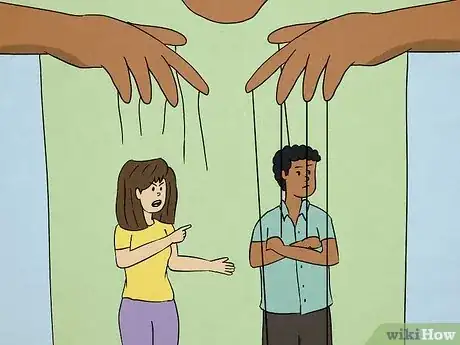This article was co-authored by Vernita Marsh, PhD and by wikiHow staff writer, Hannah Madden. Dr. Vernita Marsh is a Licensed Clinical Psychologist and the CEO and Founder of Dr. Vernita Marsh & Associates and The Marsh Clinics®. With over 30 years of clinical psychology experience, she specializes in relationship therapy, grief counseling, family therapy, and intimate partner abuse counseling. Dr. Marsh offers consultation for therapists, coaches, and trainees of mental health. Dr. Marsh earned her PhD in Clinical Psychology from Michigan State University and completed both her postdoctoral and fellowship training at Harvard Medical School. She also has expertise in the area of Telehealth and has received Clinical Telehealth Health Provider Certification from Evergreen.
There are 9 references cited in this article, which can be found at the bottom of the page.
This article has been viewed 14,329 times.
When you’re dating someone you love, the last thing you want to do is assume they’re cheating on you. But if you feel insecure or scared, you might accuse your GF of cheating, even when you know she’s not.[1]
X
Expert Source

Licensed Clinical Psychologist, Consultant, & Speaker
Expert Interview. 7 April 2022.
This is nothing to be ashamed about—lots of people go through this, and working through it may be easier than you think. Read through this article to learn why you might be having these feelings and what you can do to stop them.
Steps
Acknowledge the feelings that you’re having.
-
Being suspicious is usually an indicator of something deeper. The first step in changing these feelings is diving deep to figure out why, exactly, you’re feeling this way. Many people accuse their partners of cheating because they’re afraid or they’re insecure, so sit down with yourself and uncover the real reason why you’re feeling this way.[2] X Trustworthy Source PubMed Central Journal archive from the U.S. National Institutes of Health Go to source [3] X Expert Source

Licensed Clinical Psychologist, Consultant, & Speaker Expert Interview. 7 April 2022.- It’s less common, but some people do accuse their partners of cheating because they themselves are cheating or almost cheating. If that’s the case, you may want to examine your own actions to make sure you’re being faithful and not crossing any boundaries.
Work through past pain and trauma.
-
Sometimes, trust issues are borne out of past problems. If you dated someone in the past who cheated on you or betrayed your trust, it’s only natural that you’d be suspicious of your current girlfriend (even if it’s unwarranted).[4] X Research source [5] X Expert Source

Licensed Clinical Psychologist, Consultant, & Speaker Expert Interview. 7 April 2022. Try to get out and engage with life, and lean on family and friends for support.[6] X Research source- You might also assume your girlfriend is cheating if you were raised to belief that people are naturally unfaithful.[7]
X
Expert Source

Licensed Clinical Psychologist, Consultant, & Speaker Expert Interview. 7 April 2022. - It can be tough to work through emotions like that on your own. If you’re having trouble, talking to a mental health professional might be helpful.
- You might also assume your girlfriend is cheating if you were raised to belief that people are naturally unfaithful.[7]
X
Expert Source
Talk to your girlfriend about what’s going on.
-
Let her know that you’re working through some things. It’s important to let your girlfriend know that she’s not doing anything wrong, since being accused of cheating all the time can be tough. Sit down and talk to your girlfriend about your emotions, and let her talk, too.[8] X Research source
- You might say something like, “I wanted to let you know that I’m working through some emotions surrounding infidelity. I know that being accused of cheating all the time is hard, and I really am trying my best to stop it.”
Address any underlying issues in your relationship.
-
If you’re feeling angry at your girlfriend, you might be letting it out via accusations. Sit down and think about your relationship, and try to bring up any issues that are making you upset. If you can work through the problems in your relationship, you’ll both feel much better.[9] X Trustworthy Source PubMed Central Journal archive from the U.S. National Institutes of Health Go to source
- Maybe your girlfriend is doing something that makes you feel insecure, like DMing people on social media or chatting with guys when she’s out. Try talking to her about this and addressing the problem so you don’t keep thinking about it over time.
- Talk to her using “I feel” statements. For instance, you might say, “I sometimes feel worried that you’re talking to other dudes online.”[10] X Research source
Assume your partner has good intentions.
-
Try to remember that your girlfriend loves you and your relationship. Any time you start to think, “I wonder if she’s cheating,” remind yourself that she’s coming from a good place. If you can challenge your negative thoughts with something positive, you might be able to catch them before they fester.[11] X Research source
- For example, you might think to yourself, “My girlfriend loves me, and she shows me that every day. She’d never intentionally hurt me.”
Challenge your fear-based thinking.
-
You may be accusing your girlfriend of cheating because you’re scared. It’s normal to be worried about infidelity sometimes, but it’s important not to let those thoughts affect your life. If you start to have thoughts like, “If my girlfriend goes out tonight, she’s going to cheat on me,” challenge them with something like, “Is it helpful to think this way?” or, “What evidence do I have to support this thought?”[12] X Research source
- It can take some time for these challenges to actually stick. The more you can call attention to your fear-based thoughts, the easier it will be to change them over time.
Accept what you can’t control.
-
You’re never going to be able to control your girlfriend’s actions, and that’s okay. Try to let go of that control—if you can, you’ll feel much less anxiety about the whole situation. The only thing you can control is you and your actions, so focus on that instead.[13] X Research source
- You might tell yourself something like, “I can’t change what my girlfriend does. I can, however, change how I react to it and how I feel about it.”
Build up your own self-esteem.
-
The more secure you feel, the less anxiety you’ll have. Work on building up your self-esteem by listing all of the things that you like about yourself. Then, write down everything you bring to the relationship. Remind yourself of these qualities daily to improve your self-image and build up your confidence.[14] X Research source
- Good things to list include: “I am funny,” “I’m a kind friend,” “I’m a loving partner,” “I care for my friends and family.”
Maintain your independence.
-
Live a life outside of your girlfriend to focus on other things. Keep up with your friends, engage in your hobbies, and dive into your career. The more independence you can maintain, the less worried you’ll be about your relationship.[15] X Research source
- When you’re so involved with your relationship, it can feel like your girlfriend cheating would be the end of the world. While it would definitely be tough, if you can maintain your independence, you might feel a little better about your chances of making it on your own (if you had to).
Keep communicating with your girlfriend.
-
As you work through this process, talk to your partner and listen to her. Ask her how she’s feeling, what she’s noticed with you, and if she’s seen you improve at all. Check in with her often to keep the line of communication open, and don’t be afraid to talk about anything tough you’re going through.[16] X Research source
- You could ask her things like, “Do you feel secure in our relationship?” and, “How do you feel like I’m doing?”
Reduce outside stress.
-
If you’re stressed, you’re more likely to be suspicious of your girlfriend. Do stress-relieving activities like yoga, meditation, and spa days, and try to keep a good work-life balance. The more you can remain calm in the rest of your life, the better you’ll be able to work through your insecurities.[17] X Research source
- You could also try taking a nature walk, exercising, or listening to soothing music.
You Might Also Like



 12 Tips for Saving Your Relationship After You’ve Had an Affair
12 Tips for Saving Your Relationship After You’ve Had an Affair




 How Do You Know if Your Girlfriend Is Cheating on You over Text? 9 Signs to Look Out For
How Do You Know if Your Girlfriend Is Cheating on You over Text? 9 Signs to Look Out For





References
- ↑ Vernita Marsh, PhD. Licensed Clinical Psychologist, Consultant, & Speaker. Expert Interview. 7 April 2022.
- ↑ https://www.ncbi.nlm.nih.gov/pmc/articles/PMC5380380/
- ↑ Vernita Marsh, PhD. Licensed Clinical Psychologist, Consultant, & Speaker. Expert Interview. 7 April 2022.
- ↑ https://psychcentral.com/blog/healing-the-wounds-of-betrayal#1
- ↑ Vernita Marsh, PhD. Licensed Clinical Psychologist, Consultant, & Speaker. Expert Interview. 7 April 2022.
- ↑ https://www.psychologytoday.com/us/blog/the-mindful-self-express/201512/the-3-most-common-causes-insecurity-and-how-beat-them
- ↑ Vernita Marsh, PhD. Licensed Clinical Psychologist, Consultant, & Speaker. Expert Interview. 7 April 2022.
- ↑ https://www.loveisrespect.org/resources/things-that-crossed-the-line-for-me/
- ↑ https://www.ncbi.nlm.nih.gov/pmc/articles/PMC5380380/
- ↑ https://www.relate.org.uk/relationship-help/help-relationships/feeling-unsatisfied-your-relationship/i-feel-insecure-my-relationship
- ↑ https://www.gottman.com/blog/what-to-do-if-you-dont-trust-each-other/
- ↑ https://psychcentral.com/blog/imperfect/2018/09/how-to-stop-being-so-controlling-and-accept-uncertainty#How-to-stop-being-so-controlling
- ↑ https://psychcentral.com/blog/imperfect/2018/09/how-to-stop-being-so-controlling-and-accept-uncertainty#How-to-stop-being-so-controlling
- ↑ https://www.psychologytoday.com/us/blog/living-forward/201609/four-ways-stop-feeling-insecure-in-your-relationships
- ↑ https://www.psychologytoday.com/us/blog/living-forward/201609/four-ways-stop-feeling-insecure-in-your-relationships
- ↑ https://www.gottman.com/blog/what-to-do-if-you-dont-trust-each-other/
- ↑ https://psychcentral.com/blog/imperfect/2018/09/how-to-stop-being-so-controlling-and-accept-uncertainty#How-to-stop-being-so-controlling
About This Article
























































